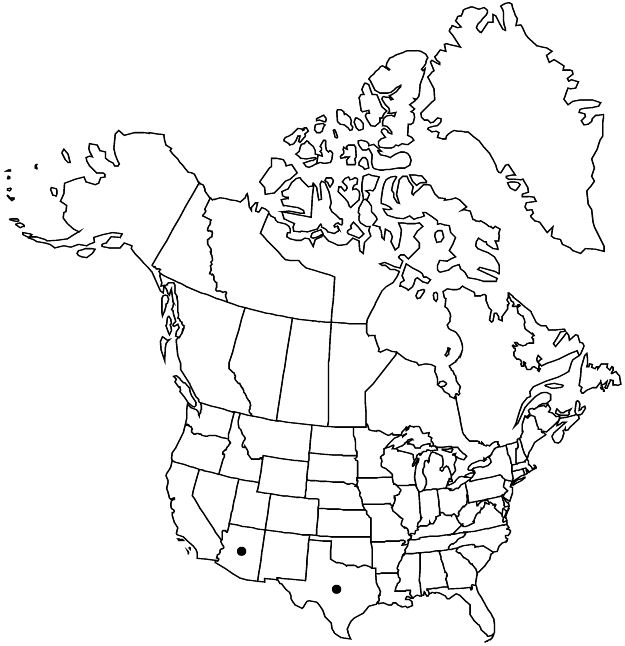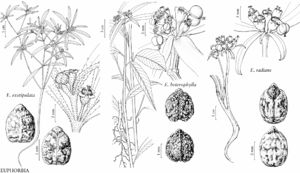Difference between revisions of "Euphorbia radians"
Pl. Hartw., 8. 1839.
FNA>Volume Importer |
imported>Volume Importer |
||
| (3 intermediate revisions by 2 users not shown) | |||
| Line 10: | Line 10: | ||
|special_status={{Treatment/ID/Special_status | |special_status={{Treatment/ID/Special_status | ||
|code=F | |code=F | ||
| − | |label= | + | |label=Illustrated |
}} | }} | ||
|basionyms= | |basionyms= | ||
| Line 16: | Line 16: | ||
|name=Poinsettia radians | |name=Poinsettia radians | ||
|authority=(Bentham) Klotzsch & Garcke | |authority=(Bentham) Klotzsch & Garcke | ||
| + | |rank=species | ||
}} | }} | ||
|hierarchy=Euphorbiaceae;Euphorbia;Euphorbia sect. Poinsettia;Euphorbia radians | |hierarchy=Euphorbiaceae;Euphorbia;Euphorbia sect. Poinsettia;Euphorbia radians | ||
| Line 40: | Line 41: | ||
-->{{#Taxon: | -->{{#Taxon: | ||
name=Euphorbia radians | name=Euphorbia radians | ||
| − | |||
|authority=Bentham | |authority=Bentham | ||
|rank=species | |rank=species | ||
| Line 54: | Line 54: | ||
|publication title=Pl. Hartw., | |publication title=Pl. Hartw., | ||
|publication year=1839 | |publication year=1839 | ||
| − | |special status= | + | |special status=Illustrated |
| − | |source xml=https:// | + | |source xml=https://bitbucket.org/aafc-mbb/fna-data-curation/src/2e0870ddd59836b60bcf96646a41e87ea5a5943a/coarse_grained_fna_xml/V12/V12_633.xml |
|genus=Euphorbia | |genus=Euphorbia | ||
|section=Euphorbia sect. Poinsettia | |section=Euphorbia sect. Poinsettia | ||
Latest revision as of 19:16, 5 November 2020
Herbs, perennial, with moniliform tuberous rootstock. Stems erect, 5–20(–30) cm, usually glabrous, occasionally puberulent; branches ± straight. Leaves alternate; petiole 0–2 mm, glabrous or strigose; blade linear-lanceolate to ovate or broadly elliptic, 25–50 × 3–20 mm, unlobed, base rounded (tapered to petiole), margins with few glandular teeth, strigillose, flat to revolute, apex acute, abaxial surface coarsely strigose, adaxial surface strigose-hirsute; venation pinnate, midvein prominent. Cyathial arrangement: terminal pleiochasial branches usually 3, occasionally reduced to congested cyme, 1–2-branched (often highly condensed); pleiochasial bracts 6–8(–10), as tight involucrate whorl, wholly white to pale pink or red, usually narrower than distal leaves; dichasial bracts linear and highly reduced. Cyathia: peduncle 2–5.5 mm. Involucre broadly globose-cupulate, 1.7–2.1 × 2.2–2.5 mm, glabrous or puberulent; involucral lobes divided into triangular segments; glands 1–4(–5), white, sessile and broadly attached, 1.1 × 1.4 mm, opening oblong, glabrous; appendages absent. Staminate flowers 20–25. Pistillate flowers: ovary glabrous or puberulent, styles 3–4 mm, 2-fid 1/2 to nearly entire length. Capsules depressed-globose, 3.8–5 × 4–5 mm, 3-lobed, glabrous or puberulent; columella 3.6–4.5 mm. Seeds white, mottled brown to gray, ellipsoid, rounded in cross section, 4–4.6 × 2.4–3.2 mm, smoothly and broadly pitted or grooved; caruncle 0.1 mm.
Phenology: Flowering and fruiting spring–summer.
Habitat: Pinyon-juniper woodlands, oak savannas, desert grasslands and scrub.
Elevation: 700–2500 m.
Distribution

Ariz., Tex., Mexico.
Discussion
Euphorbia radians is widely distributed but scattered from the Sonoran and Chihuahuan deserts south to Oaxaca in Mexico. The species is distinct among species in sect. Poinsettia in the flora area in its precocious habit, often flowering before the leaves emerge.
Selected References
None.
